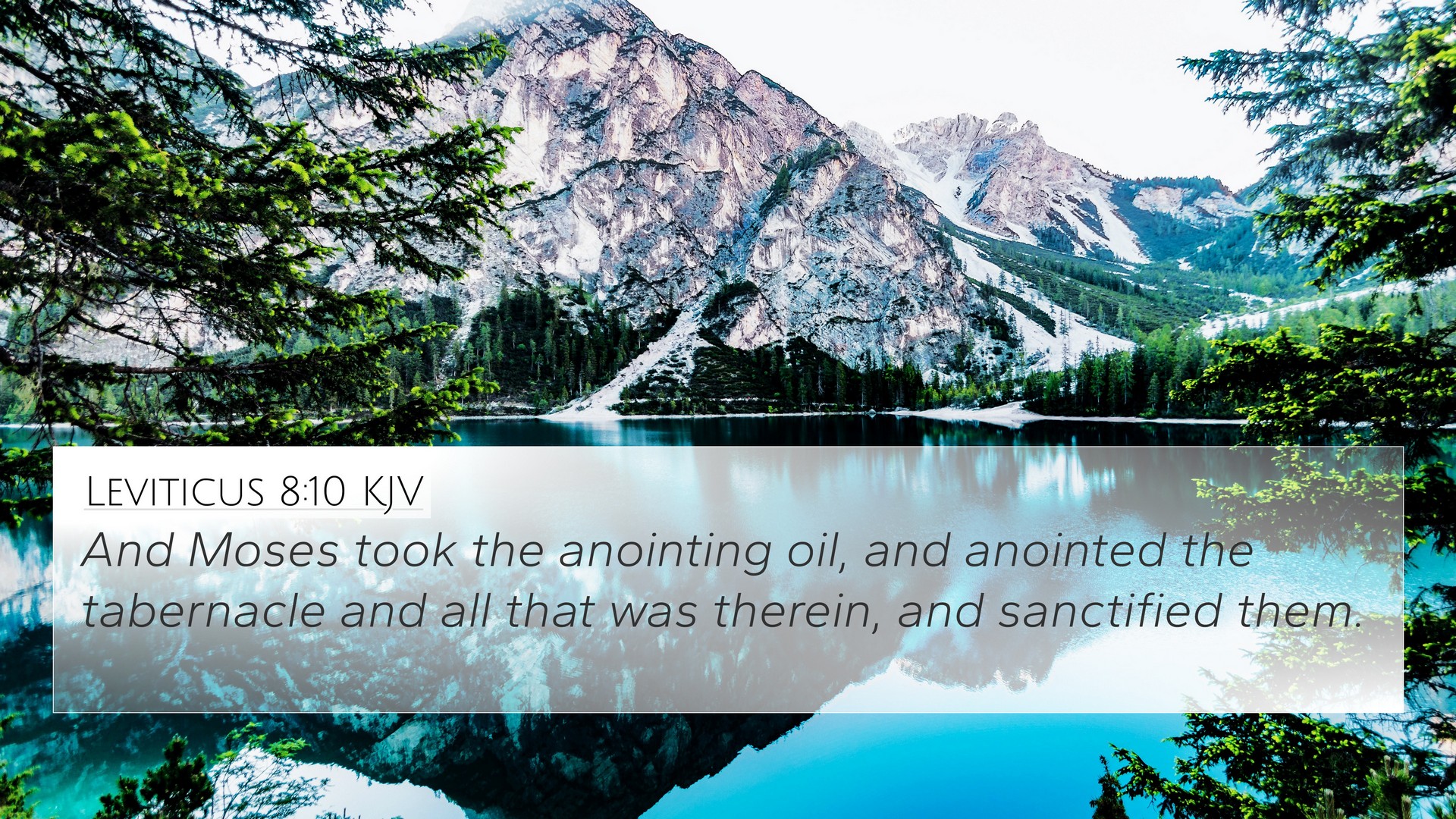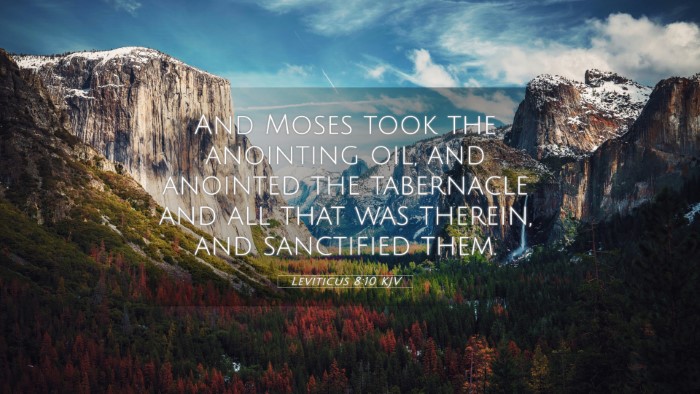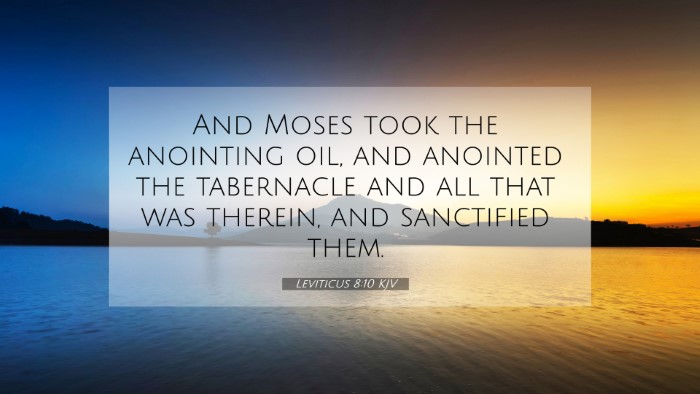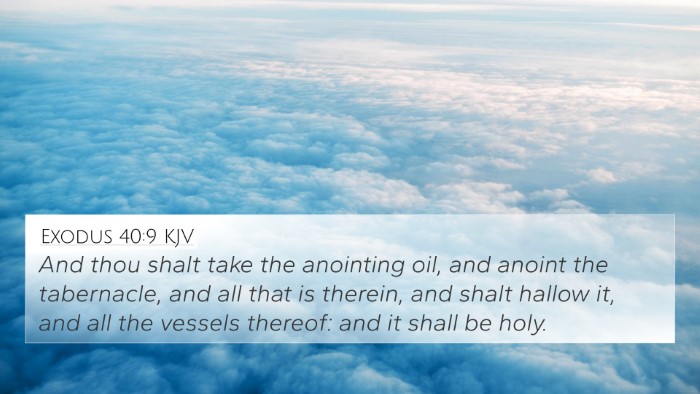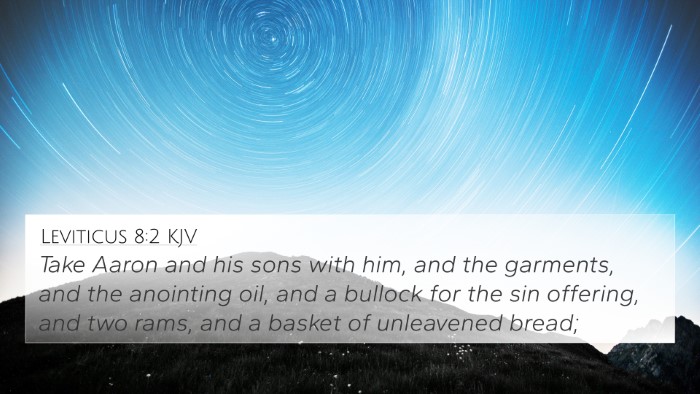Understanding Leviticus 8:10
Leviticus 8:10 states: "And Moses took the anointing oil, and anointed the tabernacle and all that was therein, and sanctified them." This verse is significant as it marks the consecration of the tabernacle, the place where God would dwell among His people. The act of anointing with oil symbolizes setting apart for holy purposes, indicating the importance of divine presence in the ritual.
Summary of Biblical Interpretation
This verse can be understood better through insights drawn from various public domain commentaries. Here, we will summarize perspectives from Matthew Henry, Albert Barnes, and Adam Clarke.
Matthew Henry's Commentary
Matthew Henry emphasizes the ceremonial significance of anointing. The anointing oil, representing the Holy Spirit, is seen as essential for consecrating not only the tabernacle but all the items associated with worship. Henry notes that the act of anointing indicates the establishment of God's dwelling place and highlights the importance of holiness in worship.
Albert Barnes' Commentary
Albert Barnes provides a detailed view, explaining that the anointing oil was made from specific ingredients, reflecting God's instructions on how to achieve holiness. Barnes points out that this act foreshadows the New Testament practice of anointing believers, marking them for God’s service. He also connects this ritual to the importance of purifying spaces for divine encounters.
Adam Clarke's Commentary
Adam Clarke explains the theological implications of this verse, suggesting that by anointing the tabernacle, Moses was instituting a new order of worship. He argues that this signifies a covenant relationship between God and Israel, hinging on the acknowledgment of God's holiness and their need for sanctification.
Connections between Bible Verses
Leviticus 8:10 has theological connections with various other scriptures, reinforcing themes of sanctification and worship. Here are some related passages:
- Exodus 30:26-29: Discusses the preparation of the holy anointing oil and its use in consecration.
- Hebrews 9:2-5: References the tabernacle and items within it, which were anointed and consecrated for worship.
- 1 Chronicles 28:10: Highlights the importance of the temple as God’s dwelling and the sanctification required.
- Romans 12:1: Calls believers to present their bodies as living sacrifices, an act of holiness reminiscent of the anointing in Leviticus.
- 2 Corinthians 1:21-22: Mentions the anointing by God through the Spirit, linking to the concept of consecration.
- 1 Peter 2:5: Describes believers as living stones, being built into a spiritual house, extending the theme of consecration.
- Ephesians 1:13: Talks about being sealed with the Holy Spirit who represents God's anointing over believers.
Thematic Connections
The themes in Leviticus 8:10 resonate throughout Scripture, creating a rich tapestry of understanding about sanctity, anointing, and divine presence. The cross-referencing of relevant biblical texts enhances comprehension and invites deeper study:
- The Sanctity of Worship: Understand the significance of purity in worship as reflected in both Leviticus and the New Testament.
- The Role of the Holy Spirit: Explore how anointing foreshadows the work of the Holy Spirit in the lives of believers.
- The Covenant Relationship: Connect God's covenant with Israel and His ongoing relationship with His people.
- Spiritual Anthropology: Reflect on the transformation and purposes God has for His people within the context of holiness.
Tools for Bible Cross-Referencing
For those seeking to deepen their understanding of the connections within scripture, various tools and methods are available:
- Bible Concordance: A comprehensive guide to locate verses and their meanings.
- Bible Cross-Reference Guide: These guides assist in identifying parallel themes and scripture links.
- Cross-Reference Bible Study: Methods for studying the Bible through intertextual relationships.
- Bible Chain References: Follow threads of themes and concepts across different books of the Bible.
Conclusion
Leviticus 8:10 serves as a crucial text for understanding the nature of divine holiness and the ritual of anointing. Through exploring its meanings via public domain commentaries and establishing connections with other verses, one can grasp the depth of this scripture. Embarking on a journey of cross-referencing allows for a fuller understanding of the theological themes and their resonance from the Old Testament to the New Testament.
